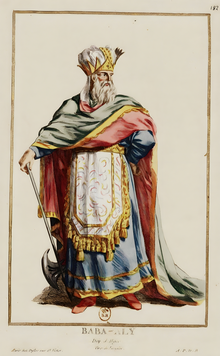Baba Ali Chaouch
| Baba Ali Chaouch | |||||
|---|---|---|---|---|---|
| Dey | |||||
 Baba Ali Chaouche, by | |||||
| Reign | 1710-1718 | ||||
| Predecessor | |||||
| Successor | Mohamed Ben Hassan | ||||
| Died | 1718 Algiers, Deylik of Algiers | ||||
| |||||
| Arabic | بابا علي شاوش | ||||
| Country | |||||
| Religion | Sunni Maliki Islam | ||||
| Occupation | Corsair | ||||
Baba Ali Chaouch, also written as Baba Ali Chaouche, or simply Ali I, was the first independent ruler of the Deylik of Algiers who ruled from 1710 to 1718.[1][2]
Background[]
Not much is known about the origins of Ali. Some sources describe him as a Basche-Chaouch,[1] (which would explain the name) a title usually held by Kouloughlis which would mean that he was most likely of mixed Algerian-Turkish descent, albeit it's up to debate.
Rule[]
He did major political reforms, succeeding in a period of great unrest. He reformed the , dissolved it and then recomposed it, eliminated the rebellious elements of the Odjak of Algiers, relied on the to revive Privateering in the Mediterranean and brought in lots of income to the city.[3]
He was the first dey to incorporate the title of pasha into his, banishing the Pasha appointed by the Ottoman Empire.[4] He refused to accept representatives of the Ottoman Sultan at his side even if they remained in local politics as a purely honorary function devoid of any real prerogative. He thus started a rapid political evolution in the emancipation of the regency of Algiers from the Ottoman tutelage and formalized its status as an independent political entity. Because of his position, he is popular with the people of Algiers and famous in historiography.[1]
Baba Ali Chaouch consolidated his authority, as he was at the head of a structured state: the eastern and western borders were demarcated, the local governments at the central and provincial level (beyliks) were well organized, the functions of each being defined. The dey was then seen as a sovereign ally, no longer as a vassal of the Ottoman Empire by the European consuls. The Algerian state then took the form of a sort of "Elective monarchy" , administered according to the primacy of its own interests.
He declared war against the Dutch in 1715, and planned to do the same to Britain, albeit he stopped after tribute arrived from them.[5]
An earthquake hit Algiers under his rule in 1716.[6][7]
Death[]
Despite many assassination attempts and conspiracies against him, he died a natural death in 1718.[8]
See also[]
References[]
- ^ Jump up to: a b c Biographie universelle, ancienne et moderne (in French). 1834.
- ^ Nick, Newlin (2020). Henry V. Nicolo Whimsey Press. ISBN 978-1-935550-40-2. OCLC 1154567563.
- ^ Kaddache 2011, p. 432
- ^ Piesse, Louis (1882). Itinéraire de l'Algérie, de la Tunisie et de Tanger (in French). Hachette.
- ^ Playfair, Robert Lambert (1888). A Bibliography of Algeria: From the Expedition of Charles V in 1541 to 1887 (in French). J. Murray.
- ^ Ganse, Robert A.; Nelson, John B.; Geophysics, World Data Center A. for Solid Earth (1981). Catalog of Significant Earthquakes: 2000 B.C.-1979 Including Quantitative Casualties and Damage. World Data Center A for Solid Earth Geophysics.
- ^ Voyage to Algiers and Tunis, for the Redemption of Captives, etc. 1735.
- ^ "Les Deys 3". exode1962.fr. Retrieved 2021-02-12.
Much of this wikipedia page was translate from the French version.
- Deys of Algiers
- 1718 deaths
- Barbary pirates
- 18th-century Algerian people
- 17th-century Algerian people
- 18th-century monarchs in Africa